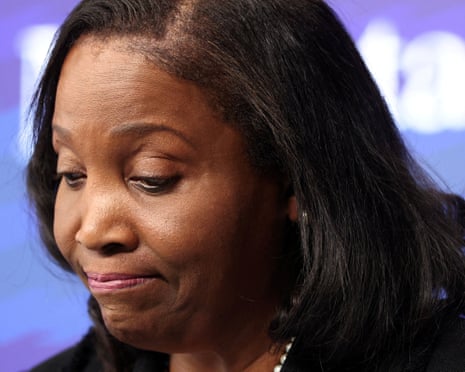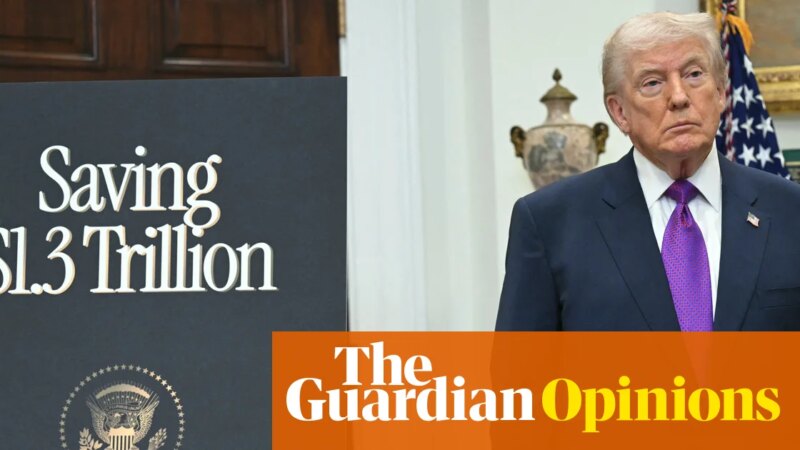Supreme court to hear arguments on Lisa Cook as Trump continues campaign for control over Federal Reserve – US politics live | US politics
US supreme court to consider Trump’s bid to fire Lisa Cook from Fed board
Hello and thank you for joining us on the US politics live blog.
The US supreme court will hear oral arguments over Donald Trump’s bid to fire a Federal Reserve governor on Wednesday morning, as his administration continues its extraordinary campaign for control over the central bank.
Trump tried to fire Lisa Cook in August over apparent discrepancies on mortgage applications his officials claim are evidence of fraud.
It was the first time in 112 years that a president had sought to remove a Fed governor.
A federal court blocked Cook’s removal, and she remains on the Fed’s rate-setting board. The Trump administration is waging an unprecedented battle with the Fed over interest rates, after policymakers defied the president’s repeated calls for drastic cuts.

Meanwhile, the Department of Justice (DoJ) has been widely criticized this month for launching a criminal investigation into Jerome Powell, the US central bank’s chair. While it is pursuing Powell over renovations to the Fed’s historic office buildings in Washington DC, he has argued he is being targeted for not “following the preferences of the president”.
Powell plans to attend Wednesday’s hearing at the supreme court in person, according to reports.
Trump as president has enjoyed wielding seemingly unlimited power from the executive branch, including allowing the so-called Department of Government Efficiency to fire tens of thousands of federal workers and defund programs across the government.
But this case is set to test his limits. Last spring, supreme court justices briefly mentioned the supreme court in an unrelated ruling around two labor officials Trump had fired. “The Federal Reserve is a uniquely structured, quasi-private entity that follows in the distinct historical tradition of the First and Second Banks of the United States,” they wrote.
Legal experts believe that the note suggests, softly, that the court may give special protections to the Fed, and its officials, that are not granted to other government agencies.
Key events

Graeme Wearden
Modesty is not high on the agenda for this speech.
Citing the new “100% expensing” rules brought in to support company investment, Trump declares “a miracle is taking place” in the US economy, which “no-one thought it would ever be done by any country”.
He added that his first term as president was the “most successful term ever” from a financial perspective.
The president is now touting the mass firings of hundreds of thousands of federal workers – a hallmark of his first year back in office.
“Nobody thought that was coming, but we had no choice to make a country great. You can’t have all federal jobs,” he said.
He claimed that civil servants left their jobs in the federal government and have started roles in the private sector with significant pay rises.
“So they started off hating me when we fired them, and now they love me,” Trump said.
“When America booms, the entire world booms,” Trump said today. “When it goes bad … you all follow us down, and you follow us up.”

Jakub Krupa
Trump opens with a zinger that it’s good to be back in Davos to “address so many respected business leaders, so many friends, a few enemies.”
He gets a laugh from the audience.
He then goes on with a long list of what he claims to be the numerous successes of his presidency, one year on – from the economy and productivity to border security.
While my colleagues and I across the Guardian will be keeping a close ear on all things Greenland and Nato in Trump’s speech today, a senior administration official tells the press pool that the president’s address will have “an America First feel” and is expected to also touch on Venezuela and tout the state of the US economy.
One quick note, White House chief of staff Susie Wiles told reporters travelling with the president today, that on Tuesday 27 January he will travel to Iowa for an economic and energy focused speech. Wiles added that Trump will make weekly travel ahead of the midterm elections. Cabinet officials are also set to amp up increase domestic travel, she said.
Donald Trump arrives in Zurich ahead of Davos talk
Despite the technical delays on Air Force One on Tuesday evening, the president has now landed in Zurich, roughly two hours later than expected.
The press pool notes that as Trump touched down in Davos, via helicopter, a short while ago. As they descended, a message written on a hillside in snow read: “Stop wars now.”
The president was due to address the conference at 8:30am ET, it’s unclear if that will be pushed back.
House Republicans are starting a push on Wednesday to hold former president Bill Clinton and former secretary of state Hillary Clinton in contempt of Congress over the Jeffrey Epstein investigation, opening the prospect of the House using one of its most powerful punishments against a former president for the first time.
The contempt proceedings are an initial step toward a criminal prosecution by the Department of Justice that, if successful, could send the Clintons to prison.
The Associated Press (AP) reports that the Clintons, both Democrats, appeared to be searching for an off-ramp to testify, and passage of contempt charges through the full House was far from guaranteed, requiring a majority vote – something Republicans increasingly struggle to achieve.
The Republican chair of the oversight committee chair, James Comer of Kentucky, initiated the contempt proceedings after the Clintons refused for months to fulfill a House oversight committee subpoena for their testimony in the panel’s Epstein probe.
The clash was the latest turn in the unpredictable Epstein saga, as Congress investigates how he was able to sexually abuse dozens of teenage girls for years.
Epstein killed himself in 2019 in a New York jail cell while awaiting trial. The public release of case files has shown details of the connections between Epstein and both Bill Clinton and Donald Trump, among many other high-powered men.
Clinton, Trump and many others connected to Epstein have not been accused of wrongdoing. Yet lawmakers are wrestling over who receives the most scrutiny.
Comer told the AP on the eve of the contempt proceedings:
They’re not above the law. We’ve issued subpoenas in good faith.
For five months we’ve worked with them. And time’s up.
US president Donald Trump will discuss his American First-based economic policies at the World Economic Forum on Wednesday, and talk about foreign policy on Thursday, a senior White House official told reporters en route to Davos.
Retuers reports that Trump may touch on issues involving Greenland and Venezuela as well as his planned Board of Peace and hemispheric domination, the official said.
The US president landed in Zurich early Wednesday and will proceed to Davos, after a problem with Air Force One delayed him by about three hours.
A planned bilateral meeting between Trump and German chancellor Friedrich Merz on Wednesday is unlikely to take place due to the US president’s late arrival, a German source told Reuters.
We have a live blog bringing you all the business and economic news from Davos, you can follow that here as well as a live blog covering all the related international diplomatic news as it happens, including Donald Trump’s threats over Greenland, and you can follow that here.
Bessent accuses Powell of ‘politicizing’ central bank
US treasury secretary Scott Bessent accused Federal Reserve chair Jerome Powell on Wednesday of “politicizing” the institution as the Trump administration intensified its pressure campaign on the central bank.
President Donald Trump has railed against Powell for not moving faster to lower interest rates, and the Department of Justice (DoJ) this month launched a criminal investigation into Powell – a move former Fed chairs labeled an effort to undermine the central bank’s independence.
Bessent on Wednesday criticized Powell’s decision to attend a supreme court hearing on Trump’s attempt to fire Fed Governor Lisa Cook, calling his presence “a political statement.”
Bessent said on the sidelines of the World Economic Forum in Davos, citing allegations Cook has denied:
I am not sure why Chair Powell would go and support Governor Cook when the Fed has not undertaken an examination of whether she did in fact commit mortgage fraud.
The Fed should not be politicized. He is politicizing the Fed.
Trump has centered his attempt to remove Cook, the first Black woman to serve on the central bank’s board of governors, on mortgage fraud allegations.
Cook has challenged the removal attempt, and the supreme court has allowed her to remain in her post until it hears her case. She has not been charged with a crime.
Adam Schiff, a US senator, is expressing alarm in a letter to the Departments of Veterans Affairs (VA) and Homeland Security (DHS), following a report from the Guardian that revealed the VA was gathering data on its “non-citizen” workforce.
The VA told the Guardian some of the information gathered could be shared with other agencies for immigration enforcement purposes.
“The request for non-citizen data,” Schiff said in a letter sent on Wednesday, “can be viewed only as a thinly veiled effort to instill fear within the VA community, which will likely be used to conduct immigration enforcement efforts.
“These intimidation tactics waste critical time and resources for VA personnel that are already stretched thin,” he added.
The Guardian reported last December on the VA’s plans, citing a leaked memo that outlined a massive data-gathering operation of all non-citizens who are “employed or affiliated with” the agency, which employs 450,000 people and enjoys affiliations with most major medical schools.
Veteran advocates and members of Congress say the sweeping language would likely also include people who work at VA contractors, medical students and even volunteers.
According to the memo, the report was to be presented to Douglas Collins, VA secretary, on 30 December. The current status of the report is unclear, according to congressional sources familiar with the VA’s internal operations.
The VA is the nation’s largest integrated healthcare system, serving 9 million veterans annually.
Since the Guardian’s first report, the VA has vehemently defended its practice.
You can read the full story from José Olivares and Aaron Glantz here: US senator calls veterans affairs’ data collection of non-citizen workers ‘thinly veiled effort to instill fear’
Trump lands in Switzerland for Davos summit
US president Donald Trump has landed in Switzerland for the World Economic Forum (WEF), according to Agence-France Presse (AFP).
An airplane with “United States of America” plastered down the fuselage has touched down at Zurich airport in the last few minutes.
Trump flew towards Davos behind schedule, after a problem with Air Force One delayed the president by about three hours.
He is due to address WEF on Wednesday afternoon, but his treasury secretary Scott Bessent previously suggested the president was “likely to be three hours late”.
The Kremlin said on Wednesday that more clarity was needed on what Donald Trump meant when he spoke of the US possessing a “secret sonic” weapon it had used during its capture of Venezuela’s Nicolás Maduro.
Trump said in an interview with NewsNation that “nobody else” had the weapon, which he said was used when Washington seized Maduro earlier this month.
Asked about Trump’s remarks, Kremlin spokesperson Dmitry Peskov said Russia has special services tasked with collecting and analysing information and that those services were doing their job.
Trump treasury secretary brands Denmark ‘irrelevant’

Graeme Wearden
Graeme Wearden tracks the latest world business, economic and financial news in our daily liveblog
Donald Trump’s treasury secretary has dismissed Denmark as “irrelevant” in his administration’s latest attack on a traditional US ally, as world leaders in Davos prepare for the president’s arrival in the Swiss ski resort.
Speaking on the sidelines of the World Economic Forum, Scott Bessent brushed aside claims that European investors, such as Denmark’s pension funds, might pull out of the market for US government debt in retaliation for Trump’s attempt to annex Greenland.
The size of Denmark’s investment in US Treasury bonds, like Denmark itself, is irrelevant.
It is less than $100m[£75m]. They’ve been selling treasuries for years. I’m not concerned at all.
He blamed the “fake news media led by the Financial Times” for amplifying a Deutsche Bank report that suggested Europe might be less willing to keep buying US government debt, amid the crisis over ownership of the Arctic island.
Bessent told reporters that the CEO of the German bank had called to say it does not stand by the findings of the report.
You can read the full report from Graeme Wearden here: Trump treasury secretary brands Denmark ‘irrelevant’ as Greenland row deepens
US president Donald Trump’s special envoy Steve Witkoff said he would meet Russian president Vladimir Putin on Thursday.
Witkoff told CNBC in an interview, referring to Putin:
Well, look, we have to go meet him on Thursday.
But it’s the Russians who are asking for that meeting. I think that’s a significant statement on their part.
The Kremlin said last week it was preparing to welcome Witkoff and Trump’s son-in-law Jared Kushner to Moscow for peace talks on Ukraine, but that no dates had been set.

Lauren Aratani
Lauren Aratani is a reporter for Guardian US
Trump’s bid to remove Cook last summer marked the first time in US history that a president fired a sitting Fed governor. She was appointed by Joe Biden in 2022, becoming the first woman of color to serve on the Fed’s board. Her term is set to be completed in 2038, as Fed governors serve at 14-year terms.
The administration has alleged that Cook committed mortgage fraud by misrepresenting multiple properties as her primary residence to get a better mortgage rate – an accusation which initially came from Bill Pulte, a close Trump ally and head of the Federal Housing Finance Agency, who has instigated similar investigations against others, including New York attorney general Letitia James and Democrat senator Adam Schiff.
Cook’s lawyers have accused the administration of “cherry-picking” information, and argued that Cook accurately listed her property on other loan documents. The discrepancy the administration is focused on is an “isolated notation”, they have said.
Beyond the accused mortgage fraud, Cook’s lawyers are arguing that Fed governors can only be fired “for cause”, and that the Fed governor was denied due process in violation of the US constitution’s fifth amendment.
You can read the full report from Lauren Aratani here: US supreme court to consider Trump’s bid to fire Lisa Cook from Fed board
US supreme court to consider Trump’s bid to fire Lisa Cook from Fed board
Hello and thank you for joining us on the US politics live blog.
The US supreme court will hear oral arguments over Donald Trump’s bid to fire a Federal Reserve governor on Wednesday morning, as his administration continues its extraordinary campaign for control over the central bank.
Trump tried to fire Lisa Cook in August over apparent discrepancies on mortgage applications his officials claim are evidence of fraud.
It was the first time in 112 years that a president had sought to remove a Fed governor.
A federal court blocked Cook’s removal, and she remains on the Fed’s rate-setting board. The Trump administration is waging an unprecedented battle with the Fed over interest rates, after policymakers defied the president’s repeated calls for drastic cuts.
Meanwhile, the Department of Justice (DoJ) has been widely criticized this month for launching a criminal investigation into Jerome Powell, the US central bank’s chair. While it is pursuing Powell over renovations to the Fed’s historic office buildings in Washington DC, he has argued he is being targeted for not “following the preferences of the president”.
Powell plans to attend Wednesday’s hearing at the supreme court in person, according to reports.
Trump as president has enjoyed wielding seemingly unlimited power from the executive branch, including allowing the so-called Department of Government Efficiency to fire tens of thousands of federal workers and defund programs across the government.
But this case is set to test his limits. Last spring, supreme court justices briefly mentioned the supreme court in an unrelated ruling around two labor officials Trump had fired. “The Federal Reserve is a uniquely structured, quasi-private entity that follows in the distinct historical tradition of the First and Second Banks of the United States,” they wrote.
Legal experts believe that the note suggests, softly, that the court may give special protections to the Fed, and its officials, that are not granted to other government agencies.





